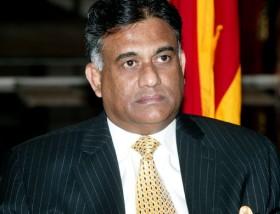SRI LANKA’S FOREIGN
MINISTER SAYS NO COUNTRY COULD ACHIEVE PEACE WHEN THERE IS TERRORISM
By Walter
Jayawardhana

Foreign Minister Rohitha Bogollagama
Totally rejecting the idea that the his government was waging a futile
war for peace Sri Lanka’s new Foreign Minister Rohitha Bogollagama
said there is no possible way to achieve peace when there is terrorism
in a country.
In an exclusive interview with the Gulf News, an Abu Dhambi newspaper
Bogollagama asked, “How do you get peace when there is terrorism?”
He said his government was getting blessings from the international
community to root out terrorism in all its forms and they would not
tolerate terrorism in their country at all.
Dr. Palitha Kohona, Secretary to the Ministry of Foreign Affairs ,
traveling with his minister , who were passing through Abu Dhabi in
transit told the newspaper that Sri Lanka wanted to maintain relations
with both India and Pakistan and the island nations relations with
both countries ran back to 2000 years.
The following is the full text of the interview Gulf News published
between the newspaper’s staffer Neena Gopal and the Sri Lankan
foreign officials:
“Sri Lanka's Foreign Minister Rohitha Bogollagama yesterday
firmly rejected international criticism that his government was waging
a futile "war for peace".
“He said no such accusations had been levelled against his government,
and asked "how do you get peace when there is terrorism?"
"We will not tolerate terrorism in our country," he said,
adding that his government had the backing of the majority of the
people and the international community to "root out and end terrorism
in all its forms".
"Even the Tamils have voted with their feet. Some 54 per cent
of Sri Lankan Tamils have left the Tiger controlled north and are
living peacefully with the rest of their compatriots in the south,"
said the minister, who led peace talks with the separatist Tamil Tigers
in Geneva last year that collapsed unceremoniously over the militia's
insistence that a key highway be re-opened.
“A lifeline to the Tiger stronghold in the Wanni, it is now
in government hands and severely limits the ability of the violent
separatists to wage their hit and run attacks on government forces.
"It was an excuse to break off talks. What kind of leaders put
the opening of a highway over the needs of their people," Bogollagama
asked, saying that his government had stepped up supplies to the besieged
city of Jaffna where food shortages had initially caused enormous
hardship.
“Issuing a strong call to the terror group, reeling from a string
of military setbacks in its rapidly shrinking north-eastern base,
to return to the negotiating table, Bogollagama announced a "new
package was under consideration" that would make the Tamils stakeholders
in the peace process.
"We are ready for peace at any time. It's the Tigers who have
to set the date for talks," he said when asked whether a new
round of peace talks was on the anvil.
“Speaking to Gulf News in Abu Dhabi while en route to Colombo
after an official visit to Pakistan, he also pointed out that "for
27 years all the previous leaders attempted the exercise but it never
happened."
"Every time it looked as if there would be a breakthrough, the
Tigers backed out. Which makes you wonder if the Tigers are for peace."
“He said Sri Lankan President Mahinda Rajapakse's government
which has in recent months steadily pushed the Tigers out of the eastern
districts of Batticaloa and Trincomalee and limits their area of operation
to the northern Jaffna peninsula beyond a Forward Defence Line laid
down by a fraying Cease-Fire Agreement, was committed to "a negotiated
settlement" while "maintaining a multi-cultural, pluralistic
society."
“Backed by a Supreme Court directive to bifurcate the north
from the east, the Sri Lankan government is likely to press ahead
with plans to secure the eastern part of the country, which the Tigers
consider part of their homeland.
Situation changing in rebel-held areas
”Abu Dhabi: Sri Lanka's new foreign secretary Palitha Kohona
said that a key indicator that the situation was changing in Tiger-held
areas was the recent shutdown of the eastern town of Vakkarai.
“It came after a Tamil priest was killed by suspected Tamil Tigers
after he greeted the visiting President Mahinda Rajapakse with a traditional
‘arati' - a lighted wick in a mud lamp and the smearing of vermilion
and turmeric paste on the forehead of the visitor.
"It's a turning point. It's the first time the Tamil people
have stood up against the Tigers."
“Kohona who accompanied the foreign minister to Islamabad, said
that Sri Lanka wanted to maintain friendly ties with both Pakistan
and India, who have stood steadfastly behind the country in its hour
of need.
"We have a 2,000 year history with both nations," he said.
”Foreign Minister Rohitha Bogollagama visited New Delhi to meet
Prime Minister Manmohan Singh soon after his appointment to seek stepped-up
patrolling of the “Palk Straits and Gulf of Mannar where the
embattled Tiger Navy run an elaborate arms smuggling network. “India
also has concerns over the Tigers pushing in operatives under the
guise of refugees.”
